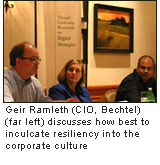
|
|
|
 |
|
 |
The Agile and Resilient Enterprise
Thought Leadership Roundtable on Digital Strategies February 27, 2007 - Sea Island, Georgia hosted by Bechtel CIOs and other senior execs from 3M, Bechtel, Canadian Pacific Railway, Eaton, Hasbro, IBM, ING, and SYSCO were joined by academics from Tuck, MIT, and Georgia Tech for this roundtable. |
||
|
Press Release
Agenda
List of Participants
Discussion Guide
Overview Article |
|||||
In this roundtable we discussed how companies can build the needed flexibility, adaptability, and resilience into an enterprise, enabling it to be prepared for, respond to, and indeed anticipate both sudden and/or fundamental changes. The participants' experiences and views yielded the following insights (see the Overview Article for a complete summary):
- Unexpected disruptive events are increasing in frequency at the same time global business is becoming leaner and more interconnected, heightening the importance of investing in resilience and agility.
- Itís the planning—not the plan—that matters most: building general capabilities is far more effective than trying to anticipate and protect against specific threats.
- Building flexibility is preferable to redundancy as a strategy for preparedness.
- Companies should use high profile events as catalysts to drive awareness, given the challenge of justifying time and resource investments in continuity planning.
- People and relationships are key success factors in crisis response, and companies should focus their preparation energies accordingly.
- Treat well-understood risks and completely unknown threats differently, both in preparation and response.
- Resilience and risk management should be embedded in DNA as a core cultural value, like safety and quality.
| The CIO as Strategic Business Partner: Leading Change and Driving Results - An Executive Workshop | |
| Embedding Information Security Risk Management into the Extended Enterprise - An Executive Workshop | |